Contests
'Grow Your Own Sonnet'
Twitter Contest

To mark our annual literary symposium, WordsThaw (March 16 to 20), and Freedom to Read Week (February 21 to 27), we've partnered with the Greater Victoria Public Library, Planet Earth Poetry and the Creative Nonfiction Collective Society to stage the Twitter First Line Contest!
Come up with the first line of a sonnet that is 140 characters or less—it must also be iambic and exactly ten syllables long—then tweet it to #140firstline. Note: that’s a zero in “140,” not a letter O.
Who knows? Your first line may be the start of a beautiful relationship with the next thirteen to come—in other words, think of your tweeted first line as your very own Sonnet Starter Kit, perhaps for Molly Peacock's Master Class, "The Sonnet as a Secret Essay," on March 20.
Enter as often as you like—and retweet, favourite, mention, and of course, dazzle us with your wit and eloquence. The scribes of the best first lines of a sonnet will win books.
 Molly Peacock will choose the winner on the Friday of every week (and announced the following Monday) until WordsThaw.
Molly Peacock will choose the winner on the Friday of every week (and announced the following Monday) until WordsThaw.
The Prizes to be won include these poetry titles!
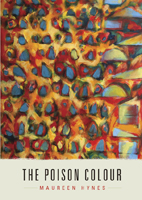 Maureen Hynes' The Poison Colour (Pedlar): The poems in Hynes's fourth collection, while moving onto more experimental ground than her previous works, retain her strong, personal voice. Looking through "the peepshow of the past," she finds the essential question: what makes us human. Beads from a broken necklace, a rosary, bounce down the centuries to link Hynes's mother's life with women's lives from earliest times. Like the artists of the arte povera movement, Hynes attends to the 'poor materials' of daily life, whether intimate or public—plywood and concrete, tarpaulin and wool, clay and asphalt. What poisons us? What enlivens us? Can one element do both? Here "the elements shift from breath to roar, warmth to sear, solid to quake. Consolation to destruction."
Maureen Hynes' The Poison Colour (Pedlar): The poems in Hynes's fourth collection, while moving onto more experimental ground than her previous works, retain her strong, personal voice. Looking through "the peepshow of the past," she finds the essential question: what makes us human. Beads from a broken necklace, a rosary, bounce down the centuries to link Hynes's mother's life with women's lives from earliest times. Like the artists of the arte povera movement, Hynes attends to the 'poor materials' of daily life, whether intimate or public—plywood and concrete, tarpaulin and wool, clay and asphalt. What poisons us? What enlivens us? Can one element do both? Here "the elements shift from breath to roar, warmth to sear, solid to quake. Consolation to destruction."
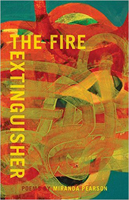 Miranda Pearson's The Fire Extinguisher (Oolichan): Miranda Pearson’s exquisite poems reveal the human psyche in ways that are both painstakingly beautiful and generous. No detail is too small to find a place in her constantly shifting vision. Threaded through with natural imagery—fire, the sea, animals and plants—alongside many references to visual art, these poems ask brave and difficult questions: how do we find a balancing place between peril and safety, can we endeavour to live in the contemporary world with compassion and hope, how do we live with uncertainty?
Miranda Pearson's The Fire Extinguisher (Oolichan): Miranda Pearson’s exquisite poems reveal the human psyche in ways that are both painstakingly beautiful and generous. No detail is too small to find a place in her constantly shifting vision. Threaded through with natural imagery—fire, the sea, animals and plants—alongside many references to visual art, these poems ask brave and difficult questions: how do we find a balancing place between peril and safety, can we endeavour to live in the contemporary world with compassion and hope, how do we live with uncertainty?
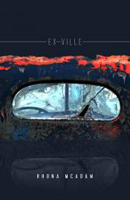 Rhona McAdam's Ex-Ville (Oolichan): Ex-Ville reflects upon what we leave behind—the people, places and journeys that shape our lives. We peer through many doorways in this suburb of the imagination. The poet's move back to Canada from her home in England unfolds in a bittersweet series of poems that probe the meaning of departure and arrival. The ambivalent pleasures of travel in an anxious but beautiful world lead us eloquently astray in many countries, longing "for home in each new bed, / worrying the nests of strangers". The poles of life from first to second childhoods are explored with deft wisdom and technical skill, whether fingering the keys of failed piano lessons or taking the wheel when old age leads parents into dementia and institutionalization.
Rhona McAdam's Ex-Ville (Oolichan): Ex-Ville reflects upon what we leave behind—the people, places and journeys that shape our lives. We peer through many doorways in this suburb of the imagination. The poet's move back to Canada from her home in England unfolds in a bittersweet series of poems that probe the meaning of departure and arrival. The ambivalent pleasures of travel in an anxious but beautiful world lead us eloquently astray in many countries, longing "for home in each new bed, / worrying the nests of strangers". The poles of life from first to second childhoods are explored with deft wisdom and technical skill, whether fingering the keys of failed piano lessons or taking the wheel when old age leads parents into dementia and institutionalization.
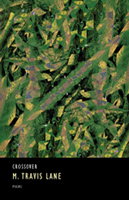 M. Travis Lane's Crossover (Cormorant): Lane’s poetry has always been diverse—variously serious, silly, melancholy, cheerful, meditative, witty, philosophical, enigmatic, colloquial, intimate, simple, complex. Asked 'What kind of poetry do you write? What do you write about?', she has replied, accurately, 'all kinds' and 'anything'. She shifts easily from lyric to monologue to epigram to song to riddle, drawing inspiration equally from the natural world and the world of art and imagination. Though her concerns are often feminist, environmental, civic, and political, her poems transcend such labels. No matter what form an individual poem takes, there is something in the voice that makes it instantly recognizable as hers.
M. Travis Lane's Crossover (Cormorant): Lane’s poetry has always been diverse—variously serious, silly, melancholy, cheerful, meditative, witty, philosophical, enigmatic, colloquial, intimate, simple, complex. Asked 'What kind of poetry do you write? What do you write about?', she has replied, accurately, 'all kinds' and 'anything'. She shifts easily from lyric to monologue to epigram to song to riddle, drawing inspiration equally from the natural world and the world of art and imagination. Though her concerns are often feminist, environmental, civic, and political, her poems transcend such labels. No matter what form an individual poem takes, there is something in the voice that makes it instantly recognizable as hers.
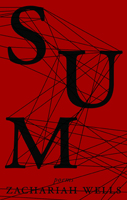 Zachariah Wells' SUM (Biblioasis): Nimbly slipping between personae, masks, and moods, the prosody—driven poems of Sum weigh the volatility and mutability of the self against the forces of habit, instinct and urge. With homages to Hopkins, Graves, Wisława Szymborska, Paul Muldoon, and more, and in allusion-dappled, playfully sprung stanzas, this third book from poet and critic Zachariah Wells both wears its influences openly and spins a sound texture all its own, in a collection far greater than its parts. “A poet of direct speech and muscular lexicon.”—Quill & Quire
Zachariah Wells' SUM (Biblioasis): Nimbly slipping between personae, masks, and moods, the prosody—driven poems of Sum weigh the volatility and mutability of the self against the forces of habit, instinct and urge. With homages to Hopkins, Graves, Wisława Szymborska, Paul Muldoon, and more, and in allusion-dappled, playfully sprung stanzas, this third book from poet and critic Zachariah Wells both wears its influences openly and spins a sound texture all its own, in a collection far greater than its parts. “A poet of direct speech and muscular lexicon.”—Quill & Quire
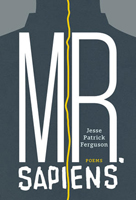 Jesse Patrick Ferguson's Mr. Sapiens (Buckrider): In Ferguson’s third collection of poems, the composer of Harmonics and the architect of Dirty Semiotics now wears the hats of raconteur, portrait artist, correspondent and naturalist. In this astonishing variety of voices, Ferguson tells us of fighter pilots made redundant by unmanned drones, the secrets hidden in great works of art, a local plague of garden slugs and the stability of the Earth’s core. Mr. Sapiens is a chameleon, a master of disguise, the consummate Everyman. Ferguson’s subtle poems catch us with our guard down and change the world before our eyes.
Jesse Patrick Ferguson's Mr. Sapiens (Buckrider): In Ferguson’s third collection of poems, the composer of Harmonics and the architect of Dirty Semiotics now wears the hats of raconteur, portrait artist, correspondent and naturalist. In this astonishing variety of voices, Ferguson tells us of fighter pilots made redundant by unmanned drones, the secrets hidden in great works of art, a local plague of garden slugs and the stability of the Earth’s core. Mr. Sapiens is a chameleon, a master of disguise, the consummate Everyman. Ferguson’s subtle poems catch us with our guard down and change the world before our eyes.
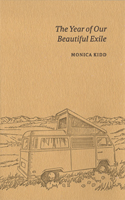 Monica Kidd's The Year of Our Beautiful Exile (Gaspereau): In these poems, Kidd observes the ways in which estrangement and loss punctuate our days, but need not always diminish them. Whether she is writing of the bicentenary of Charles Darwin’s birth, the displacement of whole communities during the epic flooding of Alberta’s rivers in 2013, or of the many minor disconnections which occur in the headlong tumble of domestic life and love (where sometimes a smartphone might seem better connected than a spouse, "remembers my birthday with a cheery tra-la"), Kidd demonstrates a keen eye for the ordinariness of loss, for the way in which the world evolves and adapts in the midst of perpetual change and for the many small moments of human connection that form our lives.
Monica Kidd's The Year of Our Beautiful Exile (Gaspereau): In these poems, Kidd observes the ways in which estrangement and loss punctuate our days, but need not always diminish them. Whether she is writing of the bicentenary of Charles Darwin’s birth, the displacement of whole communities during the epic flooding of Alberta’s rivers in 2013, or of the many minor disconnections which occur in the headlong tumble of domestic life and love (where sometimes a smartphone might seem better connected than a spouse, "remembers my birthday with a cheery tra-la"), Kidd demonstrates a keen eye for the ordinariness of loss, for the way in which the world evolves and adapts in the midst of perpetual change and for the many small moments of human connection that form our lives.
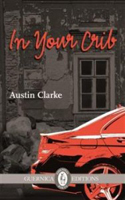 Austin Clarke's In Your Crib (Guernica): Two black men: the poet, an elder and veteran of last century's civil rights movement; and a nameless youth, swaggering and beltless, seduced by guns-and-gangs and expensive cars, and perpetually targeted by police. They are brothers by the colour of their skin, neighbours in the same "crib," yet separated by a lifetime of experience. Invoking memories of his personal encounters with leaders like Malcolm X, Stokely Carmichael and Amiri Baraka, the poet berates his heir for dropping the torch, and regrets his own failure to protect, inspire and speak out on the young man's behalf. In the tradition of Bob Marley's "Redemption Song," In Your Crib is a lyrical plea, both indictment and lamentation, and a powerful account of the ongoing struggle for racial equality."
Austin Clarke's In Your Crib (Guernica): Two black men: the poet, an elder and veteran of last century's civil rights movement; and a nameless youth, swaggering and beltless, seduced by guns-and-gangs and expensive cars, and perpetually targeted by police. They are brothers by the colour of their skin, neighbours in the same "crib," yet separated by a lifetime of experience. Invoking memories of his personal encounters with leaders like Malcolm X, Stokely Carmichael and Amiri Baraka, the poet berates his heir for dropping the torch, and regrets his own failure to protect, inspire and speak out on the young man's behalf. In the tradition of Bob Marley's "Redemption Song," In Your Crib is a lyrical plea, both indictment and lamentation, and a powerful account of the ongoing struggle for racial equality."
The weekly winners will be announced here!
February 26: James J. Stevenson; and Angela Cowan
March 4: Liz Walker; and Kyle McKillop
March 11: Jill Talbot; Lisa Mulrooney; and Renée Francoeur
March 18: Kristina Gilly
Grand Prize Winners: James J. Stevenson; and Lisa Mulrooney
The Twitter memoir contest is co-sponsored by:











